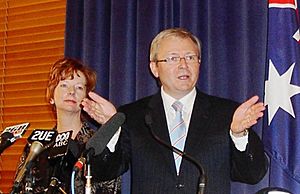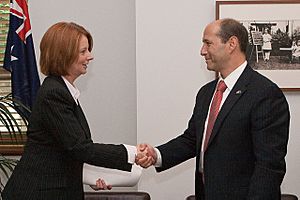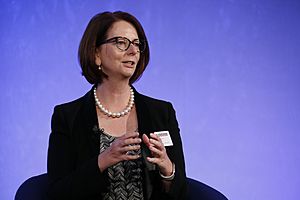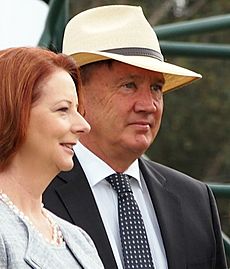Julia Gillard facts for kids
Quick facts for kids
Julia Gillard
|
|||||||||||||||||||||||||||||||||||
|---|---|---|---|---|---|---|---|---|---|---|---|---|---|---|---|---|---|---|---|---|---|---|---|---|---|---|---|---|---|---|---|---|---|---|---|
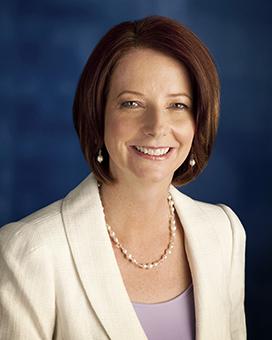
Official portrait, 2010
|
|||||||||||||||||||||||||||||||||||
| 27th Prime Minister of Australia | |||||||||||||||||||||||||||||||||||
| In office 24 June 2010 – 27 June 2013 |
|||||||||||||||||||||||||||||||||||
| Monarch | Elizabeth II | ||||||||||||||||||||||||||||||||||
| Governor General | Quentin Bryce | ||||||||||||||||||||||||||||||||||
| Deputy | Wayne Swan | ||||||||||||||||||||||||||||||||||
| Preceded by | Kevin Rudd | ||||||||||||||||||||||||||||||||||
| Succeeded by | Kevin Rudd | ||||||||||||||||||||||||||||||||||
| 19th Leader of the Labor Party | |||||||||||||||||||||||||||||||||||
| In office 24 June 2010 – 26 June 2013 |
|||||||||||||||||||||||||||||||||||
| Deputy | Wayne Swan | ||||||||||||||||||||||||||||||||||
| Preceded by | Kevin Rudd | ||||||||||||||||||||||||||||||||||
| Succeeded by | Kevin Rudd | ||||||||||||||||||||||||||||||||||
| Deputy Prime Minister of Australia | |||||||||||||||||||||||||||||||||||
| In office 3 December 2007 – 24 June 2010 |
|||||||||||||||||||||||||||||||||||
| Prime Minister | Kevin Rudd | ||||||||||||||||||||||||||||||||||
| Preceded by | Mark Vaile | ||||||||||||||||||||||||||||||||||
| Succeeded by | Wayne Swan | ||||||||||||||||||||||||||||||||||
| Deputy Leader of the Labor Party | |||||||||||||||||||||||||||||||||||
| In office 4 December 2006 – 24 June 2010 |
|||||||||||||||||||||||||||||||||||
| Leader | Kevin Rudd | ||||||||||||||||||||||||||||||||||
| Preceded by | Jenny Macklin | ||||||||||||||||||||||||||||||||||
| Succeeded by | Wayne Swan | ||||||||||||||||||||||||||||||||||
| Deputy Leader of the Opposition | |||||||||||||||||||||||||||||||||||
| In office 4 December 2006 – 3 December 2007 |
|||||||||||||||||||||||||||||||||||
| Leader | Kevin Rudd | ||||||||||||||||||||||||||||||||||
| Preceded by | Jenny Macklin | ||||||||||||||||||||||||||||||||||
| Succeeded by | Julie Bishop | ||||||||||||||||||||||||||||||||||
|
|||||||||||||||||||||||||||||||||||
| Manager of Opposition Business | |||||||||||||||||||||||||||||||||||
| In office 8 December 2003 – 10 December 2006 |
|||||||||||||||||||||||||||||||||||
| Leader |
|
||||||||||||||||||||||||||||||||||
| Preceded by | Mark Latham | ||||||||||||||||||||||||||||||||||
| Succeeded by | Anthony Albanese | ||||||||||||||||||||||||||||||||||
| Member of the Australian Parliament for Lalor |
|||||||||||||||||||||||||||||||||||
| In office 3 October 1998 – 5 August 2013 |
|||||||||||||||||||||||||||||||||||
| Preceded by | Barry Jones | ||||||||||||||||||||||||||||||||||
| Succeeded by | Joanne Ryan | ||||||||||||||||||||||||||||||||||
| Personal details | |||||||||||||||||||||||||||||||||||
| Born |
Julia Eileen Gillard
29 September 1961 Barry, Wales |
||||||||||||||||||||||||||||||||||
| Citizenship |
|
||||||||||||||||||||||||||||||||||
| Political party | Labor | ||||||||||||||||||||||||||||||||||
| Domestic partner | Tim Mathieson (2006–2021) | ||||||||||||||||||||||||||||||||||
| Education |
|
||||||||||||||||||||||||||||||||||
| Alma mater | |||||||||||||||||||||||||||||||||||
| Occupation |
|
||||||||||||||||||||||||||||||||||
| Signature |  |
||||||||||||||||||||||||||||||||||
Julia Eileen Gillard (born 29 September 1961) is an Australian former politician. She served as the 27th Prime Minister of Australia from 2010 to 2013. She was also the leader of the Labor Party. Before becoming Prime Minister, she was the 13th Deputy Prime Minister of Australia from 2007 to 2010. Julia Gillard is the first and only woman to hold either of these important roles in Australia.
Julia Gillard was born in Barry, Wales. Her family moved to Adelaide, South Australia, in 1966 when she was young. She went to school in Adelaide and later studied at the University of Adelaide and the University of Melbourne. She became a lawyer, specializing in industrial law. In 1998, she was elected to the Australian House of Representatives, representing the area of Lalor in Victoria.
After the 2007 election, Julia Gillard became Deputy Prime Minister. She also held important roles like Minister for Education. In June 2010, she became Prime Minister. She led the Labor Party in the 2010 election, which resulted in a "hung parliament" where no major party won enough seats to form a government alone. Julia Gillard successfully formed a government with the help of other politicians.
During her time as Prime Minister, her government introduced important changes. These included the National Disability Insurance Scheme (NDIS) and new funding for schools. She also oversaw the early stages of the National Broadband Network (NBN). After leaving politics, Julia Gillard has continued to work on global education and mental health initiatives.
Contents
Early Life and Education
Birth and Family
Julia Gillard was born on 29 September 1961 in Barry, Wales. She was the second daughter of John and Moira Gillard. Her father was a psychiatric nurse, and her mother worked in a nursing home.
When Julia was a child, she had a lung illness. Doctors suggested that a warmer climate would help her recover. Because of this, her family moved to Australia in 1966. They settled in Adelaide, South Australia.
In 1974, eight years after arriving, Julia and her family became Australian citizens. Before she entered the Australian parliament in 1998, she gave up her British citizenship.
School and Law Career
Julia Gillard attended Mitcham Demonstration School and Unley High School. She started studying arts at the University of Adelaide. While there, she became involved in student politics.
In 1982, she moved to Melbourne and continued her studies at the University of Melbourne. She earned degrees in law and arts. In 1987, she joined a law firm called Slater & Gordon. She became a partner in the firm in 1990, specializing in laws about workplaces and jobs.
Early Steps in Politics
Julia Gillard was interested in politics from a young age. From 1985 to 1989, she was president of a local branch of the Labor Party. She also helped create rules within the Labor Party to encourage more women to become politicians.
She was also involved in setting up EMILY's List Australia. This group helps raise money and support for Labor women who want to enter politics.
Member of Parliament (1998–2007)
Julia Gillard was first elected to the Australian House of Representatives in 1998. She represented the area of Lalor, which is a safe Labor seat near Melbourne. She gave her first speech in the House on 11 November 1998.
Shadow Minister (2001–2007)
After the 2001 federal election, Julia Gillard became part of the Shadow Cabinet. This means she was a senior member of the opposition party. She was responsible for areas like Population and Immigration.
Later, she became the Shadow Minister for Health. She was also the Deputy Manager of Opposition Business in the House. This role involved helping to manage the opposition's activities in parliament.
Deputy Opposition Leader (2006–2007)
In December 2006, Julia Gillard became the Deputy Leader of the Labor Party. This happened after Kevin Rudd successfully challenged for the leadership of the party. She was then given responsibilities for Employment, Workplace Relations, and Social Inclusion.
Deputy Prime Minister (2007–2010)
After the Labor Party won the 2007 federal election, Julia Gillard was sworn in as the first female Deputy Prime Minister of Australia. This was on 3 December 2007. She was also given a large department to manage, which included Education, Employment, and Workplace Relations.
She was part of a small group of senior ministers who helped manage the government's response to the 2008 global financial crisis. On 11 December 2007, Julia Gillard became the acting Prime Minister for the first time. This happened while Kevin Rudd was away at a climate change conference. She took on these duties many times when the Prime Minister was overseas.
Key Ministerial Work
As Minister for Education, Julia Gillard worked to improve education in Australia. She signed an agreement with the US Secretary of Education to share ideas on education reform. She also helped create the Australian Curriculum, Assessment and Reporting Authority (ACARA). This group develops a national curriculum for schools.
She launched the "Digital Education Revolution" program. This program provided laptops to public secondary school students. It also developed digital tools for schools. Another program, "Building the Education Revolution," provided money to build new classrooms and libraries.
Julia Gillard also introduced the National Assessment Program – Literacy and Numeracy (NAPLAN) in 2008. These are standardized tests given to Australian students each year. She also launched the My School website, which provides information about schools. As Minister for Employment, she replaced older industrial relations laws with the Fair Work Act.
Prime Minister (2010–2013)
Becoming Prime Minister
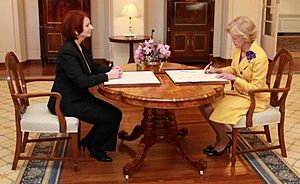
In June 2010, there was a change in leadership within the Labor Party. Kevin Rudd resigned as leader, and Julia Gillard was elected as his replacement without opposition. She was sworn in as the 27th Prime Minister of Australia on 24 June 2010.
This was a historic moment, as she became the first woman to be Prime Minister of Australia. It was also the first time that both the head of state (Governor-General Quentin Bryce) and the head of government were female.
Julia Gillard said that the previous government had "lost its way." She wanted to get the government back on track. She also became the first Prime Minister since Billy Hughes to be born overseas.
2010 Federal Election
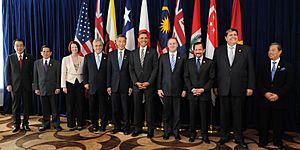
On 17 July 2010, Julia Gillard announced that a federal election would be held on 21 August 2010. She campaigned with the slogan "moving forward."
The election resulted in a "hung parliament." This means that neither the Labor Party nor the opposition won enough seats to form a government on their own. It was the first time this had happened since 1940. Julia Gillard was able to form a minority government with the support of the Australian Greens and three independent politicians.
Key Domestic Policies
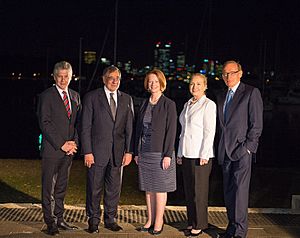
Julia Gillard's government introduced several important policies.
- Economy: Her government aimed to return the budget to a surplus. They also introduced a price on carbon emissions to help with climate change.
- Health: Health was a major focus. She announced more placements for doctors and nurses and extra nursing scholarships. Her government also reformed how health funding was managed between the federal and state governments.
- Immigration: Julia Gillard focused on managing the arrival of asylum seekers. She explored options for processing claims offshore.
- Education: Education remained a top priority. Her government continued to support the My School website. They also considered recommendations from the "Gonski Report" to increase funding for schools.
- Climate Change: Her government introduced a carbon price, which was a fixed tax on carbon emissions. This was planned to transition into a trading scheme later.
- Same-Sex Marriage: While personally not supporting same-sex marriage at the time, Julia Gillard's government allowed a vote in parliament on the issue. The bills did not pass.
Foreign Affairs and International Relations
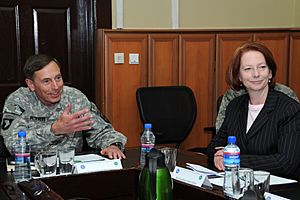
Julia Gillard represented Australia at important international meetings. She attended the Wedding of Prince William and Catherine Middleton in London in 2011. She also hosted the Commonwealth Heads of Government Meeting (CHOGM) in Perth. At this meeting, important changes were announced to the rules about who can inherit the throne in Commonwealth countries.
Her government focused on strengthening Australia's relationships with countries in Asia. This was outlined in the Asian Century White Paper. Australia also secured a seat as a non-permanent member of the UN Security Council during her time as Prime Minister.
- Afghanistan: Julia Gillard visited Australian troops in Afghanistan multiple times. Her government announced that Australian combat forces would leave Afghanistan by the end of 2013.
- India: Relations with India improved. Her government decided to allow uranium exports to India, with strict rules to ensure it was only used for peaceful purposes.
- New Zealand: Julia Gillard maintained close ties with New Zealand. She visited New Zealand and became the first foreign leader to address the New Zealand Parliament.
- United States: She strongly supported the ANZUS Alliance with the United States. She addressed a joint session of the United States Congress, highlighting the strong friendship between the two countries.
Gender and Politics
During her time as Prime Minister, Julia Gillard faced discussions about sexism in politics. In October 2012, she gave a powerful speech in parliament. In this speech, she spoke out against sexism and misogyny. The speech was widely reported around the world.
Leadership Changes
Julia Gillard faced challenges to her leadership within the Labor Party. In February 2012, Kevin Rudd challenged her for the leadership, but she won the vote. In March 2013, another leadership vote was called, but Kevin Rudd did not contest it, and Julia Gillard remained leader.
However, in June 2013, with the Labor Party's popularity low, another leadership vote was called. Julia Gillard pledged that the loser of the vote would retire from politics. Kevin Rudd challenged her again and won the vote.
Resignation and Retirement
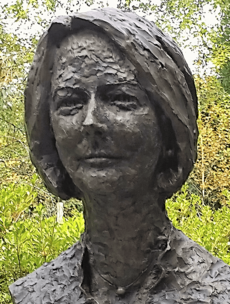
After losing the leadership vote on 26 June 2013, Julia Gillard resigned as Prime Minister. She also announced that she would not run for her parliamentary seat again, meaning she would retire from politics.
Her resignation took effect the next day. Julia Gillard served as Prime Minister for three full years. She was the longest-serving Prime Minister since John Howard at that time.
After Politics (2013–Present)
Books and Public Appearances
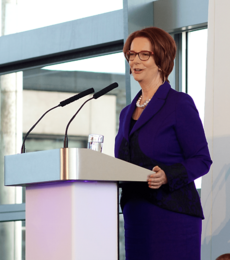
In 2014, Julia Gillard released her autobiography, My Story. In the book, she shared her experiences and thoughts on her time in politics. She has continued to be involved with the Labor Party and has appeared in documentaries and campaigns.
She supported Hillary Clinton's campaign for President of the United States in 2016. Julia Gillard spoke about the importance of women in leadership.
Awards and Roles
Since leaving politics, Julia Gillard has received many honors and appointments. She has received several honorary doctorates from universities for her work in education and social inclusion. A library in Melbourne was named the Julia Gillard Library in 2016.
She was appointed an honorary visiting professor at the University of Adelaide. In 2014, she became the chairwoman of the Global Partnership for Education. This international organization works to ensure all children in the world's poorest countries get a quality education.
In 2017, Julia Gillard became the chair of Beyond Blue, a mental health organization in Australia. She was also appointed a Companion of the Order of Australia (AC). This is a high honor for her contributions to Australia. \
In April 2021, Julia Gillard was appointed chair of the board of Governors at Wellcome Trust. This is a large charitable trust that supports research in medicine and public health. In 2021, she also received the Grand Cordon of the Order of the Rising Sun from the Government of Japan. In December 2023, she retired as Chair of Beyond Blue.
Royal Commission into Early Education
In October 2022, it was announced that Julia Gillard would lead a Royal Commission into early education in South Australia. A Royal Commission is a major public inquiry. In August 2023, she released the final report from this important commission.
Personal Life
Julia Gillard met Tim Mathieson in 2004, and they were in a relationship from 2006 to 2021.
Julia Gillard has said that she chose not to have children. She admired women who could balance raising children with a career, but felt she was too focused on her political work. She lives in Adelaide.
Interesting facts
- Gillard became the first woman to become Prime Minister of Australia.
- She was also the first Prime Minister who had never been married and the first Prime Minister born overseas since Billy Hughes.
- Julia is an atheist.
- She is a public supporter of the Western Bulldogs in Australian Rules Football and the Melbourne Storm in Rugby League.
- In 2018, she was listed as one of BBC's 100 Women.
See also
 In Spanish: Julia Gillard para niños
In Spanish: Julia Gillard para niños
- List of elected or appointed female heads of government
- List of female heads of government in Australia
 | Selma Burke |
 | Pauline Powell Burns |
 | Frederick J. Brown |
 | Robert Blackburn |


